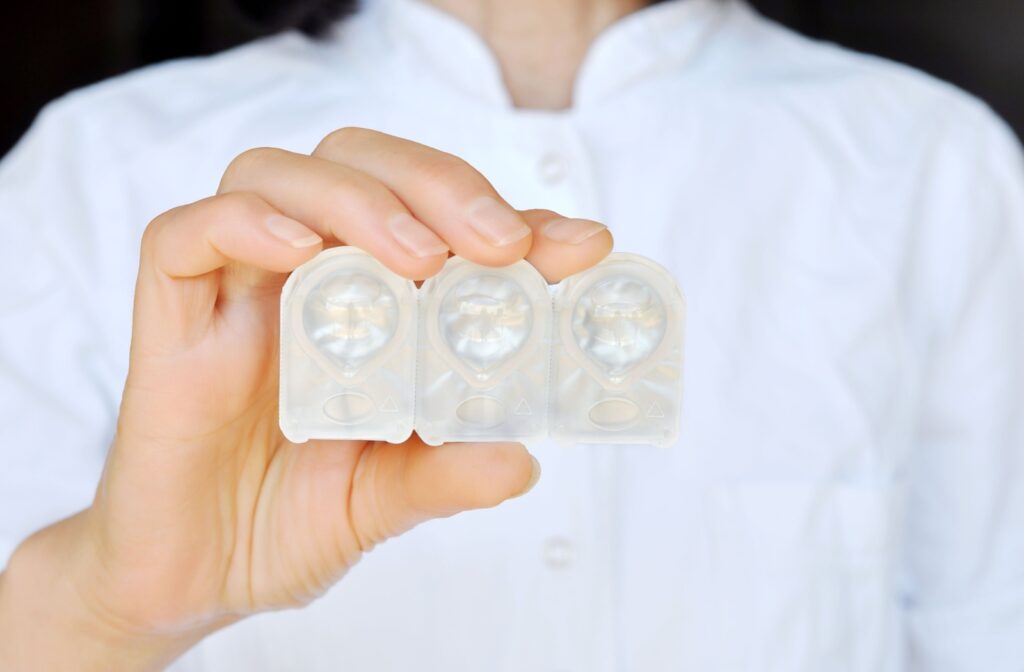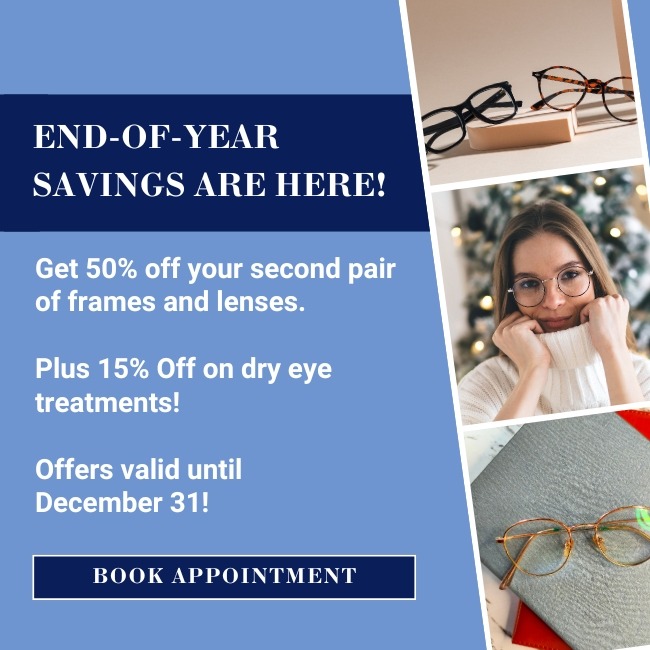Dry eyes can be frustrating and uncomfortable, but that doesn’t mean you have to compromise on your vision.
Advancements in contact lens technology have made it possible for many people with dry eyes to continue wearing contacts comfortably. This blog explores the options for wearing contacts if you have dry eyes, and offers various tips to make the process easier.
If, however, dry eyes are impacting your quality of life, consider booking an appointment with your eye care professional to find a dry eye treatment right for you.
Understanding Dry Eyes
Before diving into contact lens options, it’s important to understand what causes dry eyes. Dry eye syndrome occurs when your eyes don’t produce enough tears or when your tears evaporate too quickly. This can lead to symptoms such as:
- Redness
- Itching
- Burning sensation
- Grittiness
- Blurred vision
- Sensitivity to light
Many factors can contribute to dry eyes, including age, medications, environmental conditions, and prolonged screen time. If you experience persistent dry eye symptoms, consult with an eye care professional for a comprehensive evaluation and personalized recommendations.
Can You Wear Contacts with Dry Eyes?
The good news is that having dry eyes doesn’t automatically mean you have to give up wearing contact lenses. While some people with severe dry eyes may find contacts uncomfortable, many can still wear them with the right type of lenses and proper care. The key is to choose contact lenses designed to minimize dryness and follow a routine that helps maintain eye moisture.
Daily Disposables Can Be Better for Dry Eyes
Daily disposable contact lenses are often recommended for people with dry eyes. These lenses are designed to be worn for a single day and then discarded, which can offer many benefits for those suffering from dry eye.
Wear Fresh Lenses Every Day
Wearing a fresh pair of lenses each day reduces the buildup of deposits and allergens that can contribute to dryness and discomfort, and also minimizes the risk of eye infections and irritations.
Reduced Lens Drying
Daily disposables tend to retain moisture better than lenses worn for extended periods. These contacts are made from materials that allow higher oxygen permeability and moisture retention, keeping your eyes more comfortable throughout the day.
Convenience & Hygiene
Since daily disposables are discarded after one use, there’s no need for cleaning solutions or storage cases. This convenience can be particularly appealing for busy individuals and those with dry eyes who want to avoid the hassle of lens care.
While daily contacts can be a great option for dry eyes, it’s important to note that individual experiences may vary. Consulting with your eye doctor can help you determine whether daily disposables are the best choice for your specific needs.

What Are the Best Contacts for Dry Eyes?
Choosing the right contact lenses for dry eyes involves considering factors such as material, water content, and lens design. Here are some types of contact lenses that are often recommended for people with dry eyes:
- Silicone Hydrogel Lenses: Silicone hydrogel lenses are known for their high oxygen permeability, which allows more oxygen to reach the cornea. This can help reduce dryness and promote healthier eyes. These lenses are available in both daily and extended wear options.
- Lenses with Moisture-Rich Technologies: Some contact lenses are designed with advanced moisture technologies that help retain moisture and keep the eyes hydrated. For example, lenses with built-in wetting agents or water gradient designs can provide enhanced comfort for dry eye sufferers.
- Scleral Lenses: Scleral lenses are larger than standard contact lenses and vault over the cornea, resting on the sclera (the white part of the eye). This design creates a fluid reservoir between the lens and the cornea, providing continuous hydration and comfort for individuals with severe dry eyes.
- Low Water Content Lenses: While it might seem counterintuitive, contact lenses with lower water content can sometimes be more comfortable for people with dry eyes. High water content lenses can dehydrate more quickly, leading to dryness and discomfort. Low water content lenses are less likely to lose moisture throughout the day.
- Daily Disposable Lenses: As mentioned earlier, daily disposable lenses can be a great option for dry eyes due to their convenience and reduced risk of deposits and allergens.
- Custom-Fit Lenses: For individuals with unique eye shapes or specific dry eye needs, custom-fit lenses can provide a tailored solution. These lenses are designed based on detailed measurements of your eyes, ensuring a precise fit and optimal comfort.
Tips for Wearing Contacts with Dry Eyes
In addition to choosing the right contact lenses, there are some steps you can take to manage dry eyes and ensure a comfortable contact lens experience.
Stay Hydrated
Drinking plenty of water throughout the day can help maintain overall hydration, including the moisture in your eyes.
Use Artificial Tears
Lubricating eye drops, also known as artificial tears, can provide relief from dryness and help keep your eyes moist. Look for preservative-free options to avoid potential irritation.
Follow Proper Lens Care
If you use lenses that require cleaning, follow the recommended care routine diligently. Use the appropriate cleaning solutions and avoid using tap water to clean or store your lenses.
Take Breaks from Screens
Prolonged screen time can exacerbate dry eyes. Make sure to take regular breaks using the 20-20-20 rule: every 20 minutes, look at something 20 feet away for at least 20 seconds.
Wear Sunglasses Outdoors
Protecting your eyes from wind, dust, and sun exposure can help reduce dryness. Wear sunglasses with UV protection when spending time outdoors.
Consult Your Eye Care Professional
Regular check-ups with your eye care professional are essential for managing dry eyes and ensuring your contact lenses are still the best option for your needs. They can provide personalized recommendations and adjust your treatment plan as needed.
Find Relief Today
Dry eyes don’t have to mean the end of wearing contact lenses. With the right type of lenses and proper eye care, many people with dry eyes can continue to enjoy the convenience and benefits of contacts.
If you or a family member are experiencing dry eyes and want to explore contact lens options, ProOptix Eye Care is here to help. Our experienced team can provide personalized advice and solutions to keep your eyes comfortable and healthy. Contact us today to schedule an appointment.





